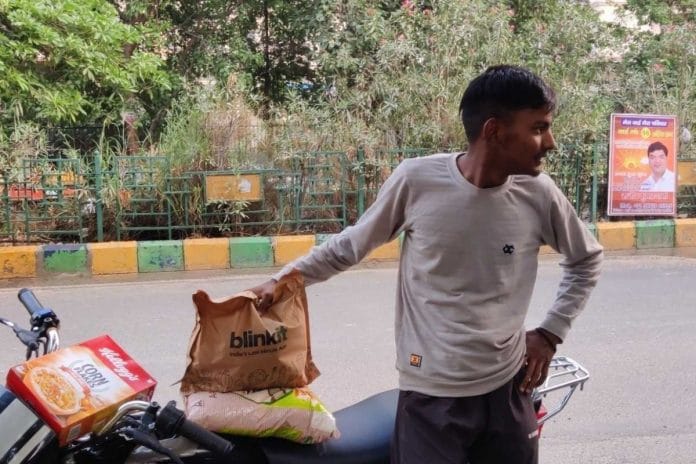Ghaziabad: Neeraj Kumar, 26, has been working for Blinkit for over three years. He has also helped his relatives, friends, and neighbours join the platform that he deeply respects and is still loyal to. But Blinkit’s latest pay cut for delivery executives has hurt his dignity and shaken his unwavering faith in the company.
The workers of Blinkit, an instant grocery delivery application, have been on strike for over a month in Delhi-NCR, with more than 1,000 delivery partners having reportedly left the firm.
Like Neeraj, many men in their early 20s are using the gig work opportunities offered by delivery platforms like Blinkit, Zepto, and Swiggy Instamart to make a living. It’s a gruelling job with long working hours and little pay, but at least it gives them a sense of control and independence that other alternatives don’t. Blinkit pay cut is being seen as a stab at their monthly cheques and an attack on the last shred of dignity they held on to.
But for Blinkit’s delivery partners at the warehouse in Indirapuram’s Niti Khand-2, the need to eat has trumped the will to protest. “How long could we sit at home? I have to work double, triple, chaupal, pachpal [four and five times] now. I have so many EMIs to pay off,” a 23-year-old delivery partner tells ThePrint.

Warehouse workers claim that out of 120 executives who frequented the store earlier, only 40 remain. While delivery partners are tired of battling inflation, poor wages and long work hours, it’s appreciation and acknowledgement they yearn for.
“We get no respect,” says Neeraj. “Our families don’t understand what we do all day. And the customers, the guards in high-rise societies, or the companies we work for don’t respect us,” he says.
Also read: Gaurakshaks go beyond Mewat, popping up across Haryana’s toll plazas. Hindu farmers angry
A thankless job
“We just want our old Blinkit back. Ask Zomato to return it to us,” Neeraj says, frustrated with the pay cut.
He lives in a dilapidated house in Kanavani, a slum on the outskirts of Indirapuram, along the Hindon river basin. At 26, he’s the head of his tribe. Delivery executives in their early 20s look up to him. After all, Neeraj, a thekedar [contractor] of sorts, has helped many people rent an electric scooter — the first hurdle in the delivery business and costs Rs 1,100 a week.
Neeraj, one of the many middlemen who facilitate renting, claims he doesn’t take any additional money from the executives.
Those he has helped include a 23-year-old with a family in debt trap, a 19-year-old who lives with an alcoholic father, and a 22-year-old who is the main breadwinner of his family.

But these young deliverymen have had enough. They won’t tolerate low wages and hostile customers anymore.
They are India’s average Gen Zs with quirky clothes and coloured hair. They express their creative side by making Instagram Reels, and spend their free time watching YouTube videos. They’ve ditched beedis for Marlboro Chhoti Advance. They want ACs in their homes and access to gym. They aspire to be social media stars and are in the lookout to upgrade their skills and become car drivers.
They are also choosy about interacting with vloggers. “Last time, a vlogger came to us for an interview but only managed to get a grand total of three views on her video. Why should I cry in front of the camera for three people?” an executive said, rejecting ThePrint’s request for an interview.
Pulled down by the weight of responsibilities, they’re stuck in the 2-km radius around Blinkit Niti Khand, where they deliver groceries in housing societies.
For Neeraj, it is important to help his community stand on its feet. “It’s not just about money; it’s about dignity.”
Blinkit’s delivery partners continue to work out of loyalty and preference, with the job offering more freedom and autonomy than alternatives such as factory or sales jobs. “With Blinkit, we can work when we prefer to and switch off the app if we don’t want to. It’s better work than a factory or a showroom,” says Neeraj, who felt ‘imprisoned’ in his previous sales job.
“It was more demanding and frustrating to be trapped in that AC showroom for hours than riding in the heat.”
While gig work is better in many ways, it is not always ideal. With long hours and minimal job security, delivery executives not only brave heatwaves and traffic, but also have to deal with dismissive family members, indifferent employers, hostile guards, and unsympathetic customers.
“Customers call the company at the slightest mistake and we get yelled at. We are banned from the platform and have to create new IDs to go back to work,” an executive alleged.
The delivery men look out for each other and often work in pairs, especially when one of them has been blocked from the platform. As they wait for the next order, they form deep bonds, sharing a smoke and chewing paan.
At Indirapuram, executives say they can earn Rs 700-800 a day by fulfilling a minimum of 40 orders, which requires non-stop work for 13 hours. “They have destroyed our life,” says Neeraj. “We used to earn Rs 5,000 a week by fulfilling 120 orders. Now we must fulfil at least 170 orders to earn that much,” he says.
Diminishing pay is a common trend throughout India’s gig economy. In marketing, companies use a penetrative pricing model whereby a product is initially offered at an extremely low price, sometimes even below cost, to attract a large customer base and eventually establish a habit. Best examples are the early days of ride-hailing, Jio internet, and call rates.
Companies seem to have employed a similar strategy with delivery executives like Neeraj. They offered higher pay to make the job seem more lucrative and slashed it later. In a traditional office setting, employees typically see their salaries increase year after year, but for gig workers, it has been the opposite.
Uber and Ola have gradually reduced incentives for their drivers while simultaneously increasing fares. Similarly, delivery partners of Swiggy and Zomato have also protested about pay cuts. For those associated with Blinkit for over four years, this is not the first time the company has implemented a pay cut. “Four years ago, I was earning Rs 40 for a delivery. Now I earn Rs 15,” says delivery executive Manoj Gautam, who also takes time out of his day to fulfil orders for Myntra. “I have seen no increase in my pay, but my delivery hours have increased significantly,” he adds. A Blinkit spokesperson, however, says incentives vary on the basis of factors like location and hours, and that riders are free to choose “when they work and for how long.”
Also read: Delhi has two community libraries that won’t discriminate or silence you
Climbing the gig ladder
The young men working for Blinkit in Indirapuram may have low self-esteem, but they’re not jaded enough to let their dreams die.
They want to climb up the ladder in their gig workplace, even though they don’t have the time or resources for extra work or studying.
“I can’t have a family because this job won’t let me sustain it,” says a 23-year-old partner who dreams of working for Uber and Ola, which he believes offer more respect and less “risk to life”.
He knows there’s no significant jump in pay prospects, but driving a four-wheeler will offer some respite from the self-worth battle they fight every day. “Our work is full of confrontation – with the company, customers, and guards at the gate. And we’re always on the losing end. Cab drivers are treated with respect; even customers are scared of them cancelling,” a delivery executive says.
Driving cabs involve more than just local driving assignments; it also means better-paying inter-city tours, and no compulsion to rash drive.
“At least I won’t be putting my life on the line every day,” another executive says. “I’d rather sit behind the wheel in an AC car and ferry customers across NCR than stand at the gates of societies and get abused,” the 23-year-old adds.
No work is bad work, says Neeraj, but Uber and Ola are at the top of the gig workers’ list of attractive work opportunities. “Delivery work and Ola bikes come second.”
Some of them are also working toward becoming influencers and YouTubers. “My YouTube channel is about various temples across India. It is very popular,” says a 27-year-old delivery executive. “Now, saints are contacting me, requesting me to feature their dhams on my channel. I am not charging money from them because this is philanthropic work,” he says. But once the channel becomes a hit, he plans to quit delivering groceries.
Also read: In Punjab, two coffins divided by 30 years—Father, son, nation…and a family left behind
Battling discrimination
A 23-year-old partner balances a bag of flour, rice, and other essentials as he searches for the correct address at Shipra Sun City, one of Indirapuram’s biggest and oldest housing societies that’s practically a township. Due to its size, Sun City doesn’t require driver partners to complete a thousand formalities at the gate. However, it lacks lifts.
“Even if an order weighs 20 kg, we’re not allowed to bring help. Some societies don’t allow us to take our bikes inside. Sometimes, we have to make three trips to deliver the entire order,” says Neeraj.
Executives don’t get paid for return or exchange orders either. “Some customers will eat the entire ice cream, leave two spoonfuls behind and then call the company for exchange saying the ice cream was too old. It doesn’t cost the customer anything, but it costs me half an hour of my time, and I don’t earn anything,” 22-year-old Robin says.
Despite all the grievances, the one thing that bothers these executives the most is the segregation they face in housing society lifts. “You can cook the items that our hands have touched but don’t want to share the same air we have breathed?” Robin asks. “Look at Saya Gold. It has 37 floors and five lifts. But cooks, cleaners, and delivery persons are only allowed to use one. It sometimes takes 45 minutes to deliver a single order there,” Robin complains.
Other executives echo his sentiments. “This is a new form of untouchability,” notes a 28-year-old partner who wishes to stay anonymous. “Sometimes I just climb floors because it’s easier and takes less time. I have climbed up to 10 floors because the lift was a no-go.”
As he hauls groceries weighing over 5 kg up the floors of Shipra Sun City, the delivery executive expresses the need for empathy from customers. “Some people are good. They offer water on a hot day, tea on a cold day. But most people don’t understand the pain we endure. It’s not an easy job,” he says.
Workers appreciate some of Blinkit’s policies, such as a Rs 1 lakh health cover and financial help in case of accidents. A company spokesperson says they even have a “dedicated response team” to address concerns partners may face. But Blinkit riders claim that most other policies are “anti-delivery executive”.
A 27-year-old partner was loitering in front of a Blinkit dark store on Saturday because his ID had been blocked. “We have to go to the bank to deposit the cash customers give us. There’s no system to allow us to give our managers the cash directly. This is extra work we don’t have time for. If we don’t deposit the cash, they immediately block our ID. I have been to the bank, and now I’m waiting for my profile to get restored,” he says.
Customers often exploit delivery partners for free services or simply enjoy harassing them. “Once, my phone was snatched by an uncle because some items were missing from the order. I had to bring my manager to the society to get my phone back,” says one partner. “Some aunties expect us to keep their groceries in the kitchen instead of taking them from the door. Why? Should we cook for them too?”
(Edited by Zoya Bhatti)






